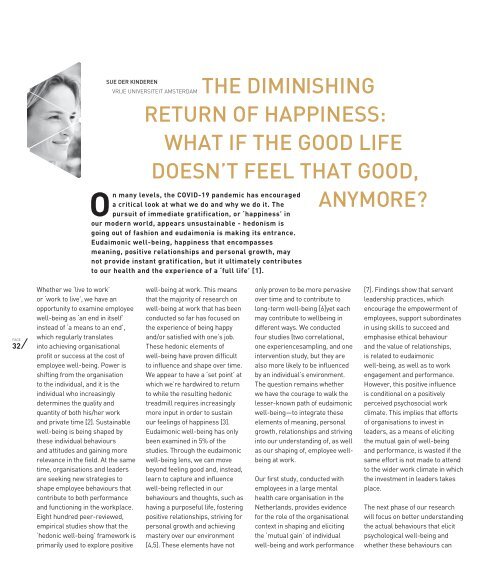Executives in Science, Business and Society 3
Create successful ePaper yourself
Turn your PDF publications into a flip-book with our unique Google optimized e-Paper software.
SUE DER KINDEREN<br />
THE DIMINISHING<br />
RETURN OF HAPPINESS:<br />
WHAT IF THE GOOD LIFE<br />
DOESN’T FEEL THAT GOOD,<br />
ANYMORE?<br />
VRIJE UNIVERSITEIT AMSTERDAM<br />
On many levels, the COVID-19 p<strong>and</strong>emic has encouraged<br />
a critical look at what we do <strong>and</strong> why we do it. The<br />
pursuit of immediate gratification, or ‘happ<strong>in</strong>ess’ <strong>in</strong><br />
our modern world, appears unsusta<strong>in</strong>able - hedonism is<br />
go<strong>in</strong>g out of fashion <strong>and</strong> eudaimonia is mak<strong>in</strong>g its entrance.<br />
Eudaimonic well-be<strong>in</strong>g, happ<strong>in</strong>ess that encompasses<br />
mean<strong>in</strong>g, positive relationships <strong>and</strong> personal growth, may<br />
not provide <strong>in</strong>stant gratification, but it ultimately contributes<br />
to our health <strong>and</strong> the experience of a ‘full life’ [1].<br />
PAGE<br />
32<br />
Whether we ‘live to work’<br />
or ‘work to live’, we have an<br />
opportunity to exam<strong>in</strong>e employee<br />
well-be<strong>in</strong>g as ‘an end <strong>in</strong> itself’<br />
<strong>in</strong>stead of ‘a means to an end’,<br />
which regularly translates<br />
<strong>in</strong>to achiev<strong>in</strong>g organisational<br />
profit or success at the cost of<br />
employee well-be<strong>in</strong>g. Power is<br />
shift<strong>in</strong>g from the organisation<br />
to the <strong>in</strong>dividual, <strong>and</strong> it is the<br />
<strong>in</strong>dividual who <strong>in</strong>creas<strong>in</strong>gly<br />
determ<strong>in</strong>es the quality <strong>and</strong><br />
quantity of both his/her work<br />
<strong>and</strong> private time [2]. Susta<strong>in</strong>able<br />
well-be<strong>in</strong>g is be<strong>in</strong>g shaped by<br />
these <strong>in</strong>dividual behaviours<br />
<strong>and</strong> attitudes <strong>and</strong> ga<strong>in</strong><strong>in</strong>g more<br />
relevance <strong>in</strong> the field. At the same<br />
time, organisations <strong>and</strong> leaders<br />
are seek<strong>in</strong>g new strategies to<br />
shape employee behaviours that<br />
contribute to both performance<br />
<strong>and</strong> function<strong>in</strong>g <strong>in</strong> the workplace.<br />
Eight hundred peer-reviewed,<br />
empirical studies show that the<br />
‘hedonic well-be<strong>in</strong>g’ framework is<br />
primarily used to explore positive<br />
well-be<strong>in</strong>g at work. This means<br />
that the majority of research on<br />
well-be<strong>in</strong>g at work that has been<br />
conducted so far has focused on<br />
the experience of be<strong>in</strong>g happy<br />
<strong>and</strong>/or satisfied with one’s job.<br />
These hedonic elements of<br />
well-be<strong>in</strong>g have proven difficult<br />
to <strong>in</strong>fluence <strong>and</strong> shape over time.<br />
We appear to have a ‘set po<strong>in</strong>t’ at<br />
which we’re hardwired to return<br />
to while the result<strong>in</strong>g hedonic<br />
treadmill requires <strong>in</strong>creas<strong>in</strong>gly<br />
more <strong>in</strong>put <strong>in</strong> order to susta<strong>in</strong><br />
our feel<strong>in</strong>gs of happ<strong>in</strong>ess [3].<br />
Eudaimonic well-be<strong>in</strong>g has only<br />
been exam<strong>in</strong>ed <strong>in</strong> 5% of the<br />
studies. Through the eudaimonic<br />
well-be<strong>in</strong>g lens, we can move<br />
beyond feel<strong>in</strong>g good <strong>and</strong>, <strong>in</strong>stead,<br />
learn to capture <strong>and</strong> <strong>in</strong>fluence<br />
well-be<strong>in</strong>g reflected <strong>in</strong> our<br />
behaviours <strong>and</strong> thoughts, such as<br />
hav<strong>in</strong>g a purposeful life, foster<strong>in</strong>g<br />
positive relationships, striv<strong>in</strong>g for<br />
personal growth <strong>and</strong> achiev<strong>in</strong>g<br />
mastery over our environment<br />
[4,5]. These elements have not<br />
only proven to be more pervasive<br />
over time <strong>and</strong> to contribute to<br />
long-term well-be<strong>in</strong>g [6]yet each<br />
may contribute to wellbe<strong>in</strong>g <strong>in</strong><br />
different ways. We conducted<br />
four studies (two correlational,<br />
one experiencesampl<strong>in</strong>g, <strong>and</strong> one<br />
<strong>in</strong>tervention study, but they are<br />
also more likely to be <strong>in</strong>fluenced<br />
by an <strong>in</strong>dividual’s environment.<br />
The question rema<strong>in</strong>s whether<br />
we have the courage to walk the<br />
lesser-known path of eudaimonic<br />
well-be<strong>in</strong>g—to <strong>in</strong>tegrate these<br />
elements of mean<strong>in</strong>g, personal<br />
growth, relationships <strong>and</strong> striv<strong>in</strong>g<br />
<strong>in</strong>to our underst<strong>and</strong><strong>in</strong>g of, as well<br />
as our shap<strong>in</strong>g of, employee wellbe<strong>in</strong>g<br />
at work.<br />
Our first study, conducted with<br />
employees <strong>in</strong> a large mental<br />
health care organisation <strong>in</strong> the<br />
Netherl<strong>and</strong>s, provides evidence<br />
for the role of the organisational<br />
context <strong>in</strong> shap<strong>in</strong>g <strong>and</strong> elicit<strong>in</strong>g<br />
the ‘mutual ga<strong>in</strong>’ of <strong>in</strong>dividual<br />
well-be<strong>in</strong>g <strong>and</strong> work performance<br />
[7]. F<strong>in</strong>d<strong>in</strong>gs show that servant<br />
leadership practices, which<br />
encourage the empowerment of<br />
employees, support subord<strong>in</strong>ates<br />
<strong>in</strong> us<strong>in</strong>g skills to succeed <strong>and</strong><br />
emphasise ethical behaviour<br />
<strong>and</strong> the value of relationships,<br />
is related to eudaimonic<br />
well-be<strong>in</strong>g, as well as to work<br />
engagement <strong>and</strong> performance.<br />
However, this positive <strong>in</strong>fluence<br />
is conditional on a positively<br />
perceived psychosocial work<br />
climate. This implies that efforts<br />
of organisations to <strong>in</strong>vest <strong>in</strong><br />
leaders, as a means of elicit<strong>in</strong>g<br />
the mutual ga<strong>in</strong> of well-be<strong>in</strong>g<br />
<strong>and</strong> performance, is wasted if the<br />
same effort is not made to attend<br />
to the wider work climate <strong>in</strong> which<br />
the <strong>in</strong>vestment <strong>in</strong> leaders takes<br />
place.<br />
The next phase of our research<br />
will focus on better underst<strong>and</strong><strong>in</strong>g<br />
the actual behaviours that elicit<br />
psychological well-be<strong>in</strong>g <strong>and</strong><br />
whether these behaviours can

















